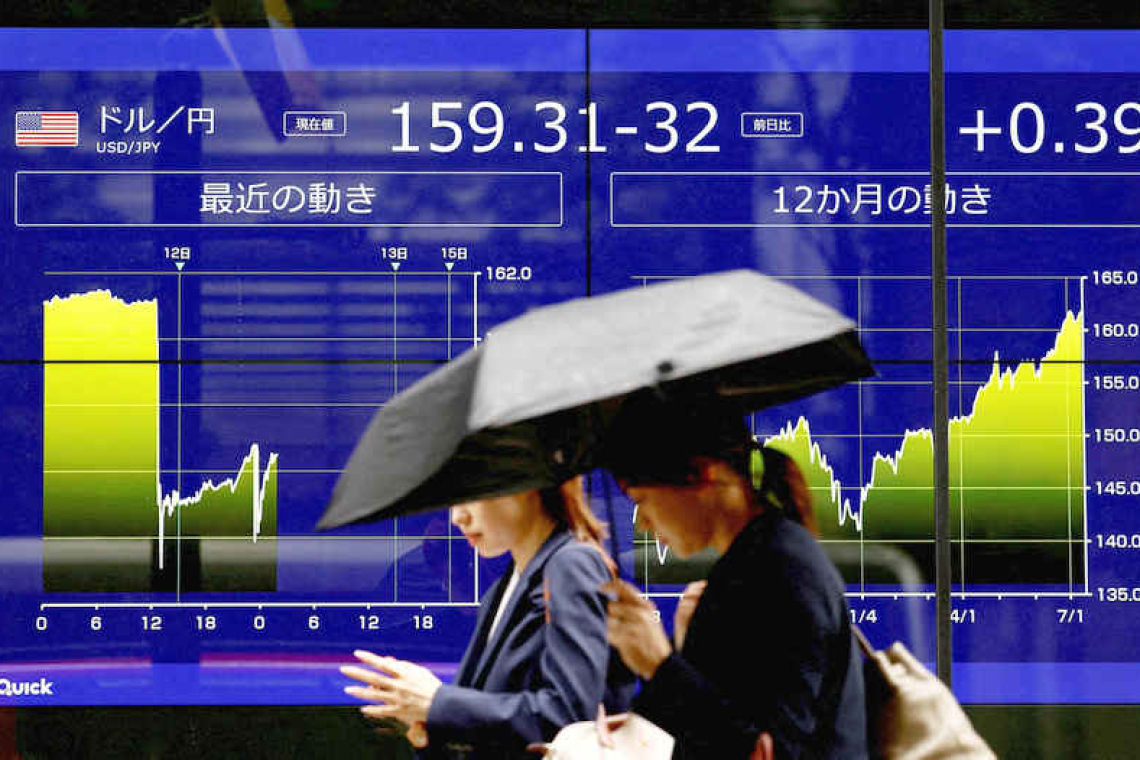TOKYO--Japanese leaders rushed on Tuesday to assuage concerns about the sharp swings in the country's financial markets, with the prime minister urging calm and senior finance officials convening an emergency meeting to discuss the global stock market sell-off.
The executives from Japan's Ministry of Finance, the Financial Services Agency and the Bank of Japan (BOJ) held the trilateral meeting on Tuesday afternoon, said Atsushi Mimura, the country's top currency diplomat, emphasising close coordination between the government and the central bank.
"The government and the BOJ agreed that it is important to monitor developments in economic and financial markets domestic and abroad with a sense of urgency while calmly assessing what is happening," Mimura told reporters after the meeting.
The gathering is typically held in times of market turbulence, partly as a gesture that authorities are willing to act. A similar meeting was last held on March 27 this year following a sharp decline in the value of the yen.
Stocks tumbled across the world on Monday as a sell-off that began last week picked up momentum, only to recover some ground on Tuesday, leaving bruised investors feeling whip-lashed. The Nikkei stock index soared on Tuesday in a relief rally after plummeting 12.4% on Monday, its biggest percentage drop since the 1987 Black Monday crash. It ended Tuesday's trade up 10.2% at 34,675.46.
Mimura declined to comment on factors driving the stock plunge but said the three parties shared a view that the Japanese economy will continue to gradually recover.
Japanese Prime Minister Fumio Kishida urged caution, saying it was important to make calm judgements about the market. He offered an optimistic outlook for the world's fourth largest economy, citing factors such as the first rise in inflation-adjusted real wages in more than two years in June.
"We recognise the Japanese economy continues to make a strong transition to a new stage," Kishida told reporters in Hiroshima earlier on Tuesday.
Japanese Finance Minister Shunichi Suzuki said the government would monitor and analyse financial market moves and work closely with relevant authorities, including the BOJ. "It's important to realise resilient economic growth while responding to changes in front of us," Suzuki said.
Elsewhere, Investors said the aftershocks of a massive carry trade that has reverberated through global financial markets wasn't done yet, with more unwinding in the days ahead raising the risk of shake-outs to other assets.
The massive selloffs had come after a higher-than-expected U.S. unemployment rate on Friday sparked worries the U.S. economy was heading for a recession. Concerns about the markets were exacerbated by investors winding down yen-funded trades that had been used to finance the acquisition of stocks for years after a surprise Bank of Japan rate hike last week.
The so-called 'carry trade' is commonly used in currency markets where investors borrow money from economies with low interest rates such as Japan or Switzerland, to fund investments in higher-yielding assets - this time stocks - elsewhere. Despite the easing off in selling, investors were worried about more volatility ahead.
"We expect the sell-off to continue for maybe a few more days as usually these... trades are pretty large," said Zhe Shen, head of diversifying strategies at TIFF Investment Management. "People said 'wait, we're losing too much money from unwinding. Let's just hold and we'll unwind some more tomorrow."
The complete unwind of this yen-funded trade is likely to take days, potentially extending the market rout, Zhe said. "There's tons and tons of yen carry trades that still have to be closed out," said Ulf Lindahl, CEO at institutional investors advisory firm Currency Research Associates.
Investors are still scrambling to figure out the size of those trades and how much of the cheap funding was deployed in equities. Calculations made by hedge fund research firm PivotalPath show that hedge fund strategies most affected by a yen rally are global macro quantitative and managed futures, as they have short exposure to the Japanese currency. A spike in the yen this month indicates a loss of between 1.5% and 2.5% in August for those funds' indexes, according to the firm's exposure model.
"It's very, very hard to know what the actual size of those positions are and how much is hedged and how much isn't hedged, and therefore how much pressure is on," said Kathy Jones, chief fixed income strategist at Schwab. "When you get hedge funds that are leveraged, and maybe there are derivatives involved, you get a pretty sizable reaction."







